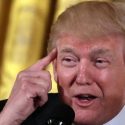Puerto Rico - The time for democracy is now
Carlos Mercader,
“All peoples have the right of self-determination. By virtue of that right they freely determine their political status and freely pursue their economic, social and cultural development.”
– Article 1 in the International Covenant on Civil and Political Rights (ICCPR)
This Sunday, Puerto Ricans will cast their votes in a political-status referendum, exercising their democratic right to decide the island’s future. Self-determination is central to the rights of all Americans citizens, including Puerto Ricans, and it is arguably the defining principle of our democracy.
Unfortunately, even after 100 years of U.S. citizenship, and after hundreds of thousands of Puerto Ricans have served in the U.S. Armed Forces during wartime and peacetime, the more than 3.4 million residents of Puerto Rico lack rights equal to those of American citizens living in U.S. states. As an unincorporated U.S. territory, we cannot vote for the U.S. president, nor do we have voting representation in Congress. Yet, we are subject to federal laws which treat us unequally.
The passage of the “Puerto Rico Oversight, Management, and Economic Stability Act” (PROMESA) last year further limits our local self-governance.
More importantly, Puerto Rico’s current territory status has led to a multitude of unequal, inconsistent, and disjointed federal laws and policies that have severely limited the island’s development, and contributed greatly to the current fiscal, economic and demographic crisis that is the worst in our history.
This includes the “Medicaid Cliff,” a disaster averted in the short-term, that may yet cost as many as 600,000 American citizens and at least 93,000 family members of veterans access to healthcare – benefits they would receive as residents of any U.S. state. The crisis has also led to a staggering exodus of young Americans from Puerto Rico, over 400,000 in the last decade alone, which robs our communities of innovation and inspiration, and increases costs for states at the receiving end of this migration as well as for the federal government.
To truly address Puerto Rico’s immediate and long-term prospects for economic growth and prosperity, it is essential to resolve the current unequal and undemocratic territory status that has persisted for over 100 years. After the 2012 plebiscite on Puerto Rico’s political status – where a clear majority (54 percent) opposed continuing the current territory status and among those that voted for a non-territorial option 61 percent supported statehood – Congress asked the Government of Puerto Rico to carry out a voter education campaign and a new plebiscite on, “options that would resolve Puerto Rico’s future political status.”
Accordingly, on June 11, 2017, millions of Puerto Ricans will participate in a plebiscite to definitively answer this question, by choosing between statehood, free association/independence, or current territorial status.
The inclusion of the last option – retaining the status quo – is directly tied to Governor Ricardo Rosselló’s commitment to ensure the plebiscite’s legitimacy and in correspondence with the U.S. Department of Justice (DOJ) April 13th letter after their review of the original plebiscite ballot. There should not be any doubt that after the polls close on Sunday, the results must be considered to be the freely expressed will of the Puerto Rican people and a genuine act of self-determination. To further assure the transparency of the democratic process, the Puerto Rico Department of State has invited an independent-bipartisan group of respected political leaders to the island as electoral observers to oversee the process.
Importantly, the plebiscite also represents an important step in relation to the current reform process happening in Puerto Rico under PROMESA, and is representative of a demand to definitively define the future status of an island and people that need certainty in a time of incredible turmoil. I urge Congress to recognize the results of the upcoming plebiscite as what they are – a legitimate, defining expression of self-determination, keeping in mind that resolving the status is not merely an important issue, it is the central issue for Puerto Rico.
If nothing changes and our failed territory status continues, overcoming this economic crisis will take far longer and require far more investment than ever needed before. It will only delay the island’s economic, social and cultural recovery. Without the opportunity for self-determination, residents of Puerto Rico will be denied the opportunity to develop and contribute to the great American mosaic.
Congress must resolve Puerto Rico’s status to unleash its full potential.
Carlos Mercader is the Executive Director of the Puerto Rico Federal Affairs Administration.




